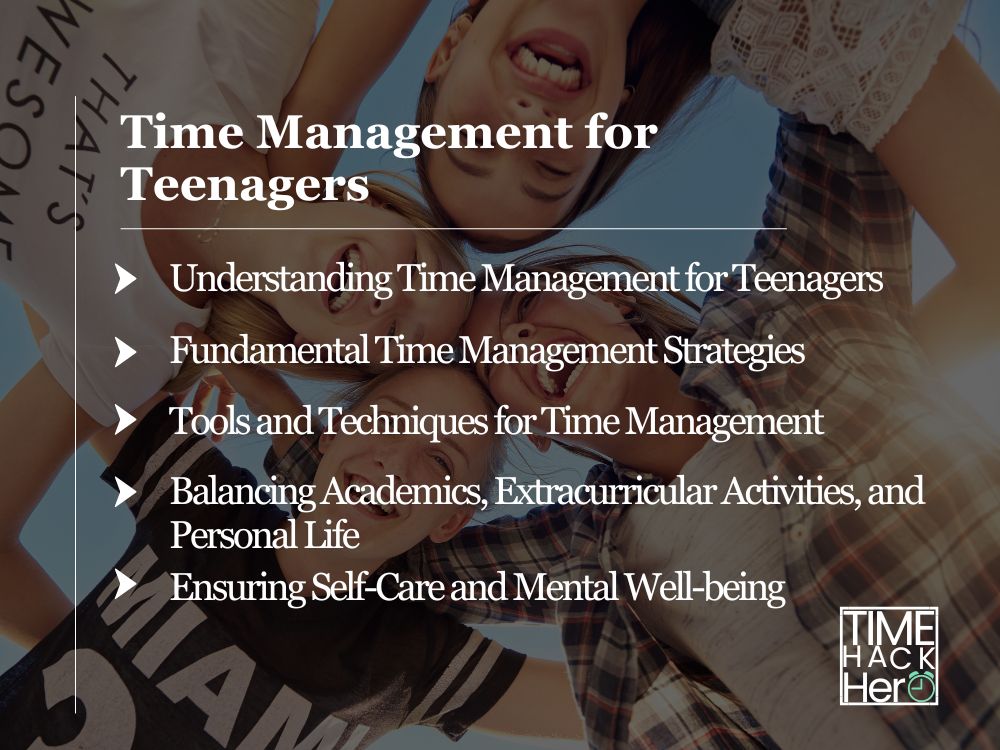Time management is an essential life skill that becomes increasingly important during adolescence. As teenagers navigate school, extracurricular activities, and social lives, they must learn how to balance numerous responsibilities and allocate time effectively. Teaching teenagers effective time management techniques not only helps them succeed academically and stay organized, but also lays the groundwork for lifelong success in their future endeavors.
In the fast-paced world we live in, having good time management skills for teens is crucial to managing stress, meeting deadlines, and maintaining a healthy balance between academics, personal pursuits, and relaxation. Incorporating techniques such as breaking up big tasks into smaller ones, establishing routines, and using tools like planners and the Pomodoro Technique can greatly impact a teenager’s ability to manage their time efficiently.
This article will explore various strategies and tools that can assist teenagers in improving their time management skills. By understanding the importance of prioritizing tasks, creating a balanced schedule, and learning to avoid procrastination, teens will be better prepared to tackle their responsibilities with confidence and a sense of control.
Table of Contents
Understanding Time Management for Teenagers
Challenges Faced by Teens
Teenagers face numerous challenges when it comes to time management. Juggling school work, extracurricular activities, social life, and family responsibilities can be overwhelming. Additionally, the pressure to meet expectations from parents, teachers, and themselves adds stress to their daily lives. In this digital era, distractions such as social media, online gaming, and binge-watching shows can make it even more difficult for teens to manage their time efficiently.
Importance of Time Management Skills
Developing good time management skills in adolescence is crucial for several reasons. First, it helps teens perform better in high school, enabling them to meet academic goals and maintain a healthy balance between their studies, personal life, and physical wellbeing. Second, cultivating these skills early on prepares them for college, where they are likely to face increased responsibilities and a greater degree of autonomy. Finally, mastering time management early in life sets a strong foundation for their future professional lives, allowing them to become successful and well-rounded adults.
To support their journey, it is essential for parents, educators, and mentors to provide tools and resources to help them overcome the challenges and recognize the importance of time management in their lives. A few practical strategies include breaking up big tasks, setting clear goals, and establishing routines. Encourage the use of timers, such as the Pomodoro timer, to help maintain focus and avoid distractions. Additionally, discussing stress management strategies can empower teens to cope with internal and external stressors that may hinder effective time management.
Fundamental Time Management Strategies
Setting Priorities
The first priority for teenagers is to prioritize their tasks. Write down all upcoming tasks, including homework, chores, and fun activities. Then, organize them based on their importance and deadlines. This method helps teenagers focus on important tasks, allowing them to allocate time accordingly. To make prioritizing easier:
- Use lists or digital tools to record tasks
- Separate tasks into categories like school, fun, and chores
- Set goals for each task to ensure they are completed by their deadlines
- Review priorities regularly to stay focused and make adjustments as needed
Creating Routines
Developing routines can help manage time effectively. These routines should cover different aspects of a teenager’s life, such as morning and evening routines, homework routines, and even fun activities. Here are some strategies to build routines:
- Allocate specific time slots for homework or studying
- Plan and schedule breaks for leisure and relaxation
- Establish a consistent bedtime and wake-up time
- Set consequences for not following routines, such as losing privileges or facing additional chores
Dealing with Procrastination
Procrastination is a common obstacle teens face in managing their time. To combat procrastination, consider the following strategies:
- Break down tasks into smaller, manageable parts
- Use a timer to work in short intervals, such as the Pomodoro Technique
- Identify and eliminate potential distractions, like smartphones and social media
- Perform a time audit to identify time wasters and replace them with productive activities
Teaching teenagers to prioritize, create routines, and deal with procrastination will not only help them manage their time better but also help them develop lifelong skills for success.
Tools and Techniques for Time Management
Using Planners and Calendars
Planners and calendars are essential tools for teenagers who want to manage their time effectively. Encourage teenagers to use physical or digital planners and calendars to note important dates, deadlines, and events. These tools help them to plan their schoolwork, chores, social life, and job commitments in advance. Some helpful apps for managing calendars include Google Calendar and Trello, which also provide features for setting reminders and syncing across devices.
Leveraging Organizational Tools
Many organizational tools can be used to improve time management for teenagers. Here are some examples:
- Eisenhower Matrix: This decision-making tool divides tasks into four quadrants based on urgency and importance, helping prioritize tasks and allocate time efficiently.
- Pareto Principle (80/20 Rule): This principle suggests that 80% of the outcomes come from 20% of the efforts, enabling teens to allocate more attention and resources to high-impact activities.
- To-do lists and task management apps: Writing down tasks in a list or using apps like Todoist or Wunderlist helps teenagers track what needs to be done and stay organized.
Effective Time Management Techniques
Several time management techniques can be beneficial for teenagers. Here are a few:
- Pomodoro Technique: This method involves breaking work into focused intervals (typically 25 minutes) with short breaks in between. Structuring time with the Pomodoro Technique can help improve concentration and maintain motivation.
- Daily scheduling: By setting a clear daily schedule, including school, chores, and extracurricular activities, teenagers can allocate their time efficiently and avoid being overwhelmed.
- Setting goals: Encourage teenagers to set realistic and achievable goals, both short-term and long-term, to guide their planning and decision-making skills.
It’s important to highlight the role of electronics and their impact on time management. Remind teenagers to limit distractions, such as social media or excessive screen time, while working on tasks requiring focus and concentration. Using alarms or apps to set dedicated time blocks for studying, chores, or job responsibilities can further improve time management and organization skills.
Balancing Academics, Extracurricular Activities, and Personal Life
Managing Schoolwork and Deadlines
To excel in academics, it is essential for teenagers to develop a routine that includes allocating specific time for different subjects. This involves creating a well-structured schedule to avoid procrastination and reduce stress during the school week. Here are some tips:
- Plan a weekly study timetable that balances school, homework, and extracurricular activities.
- Set realistic goals and deadlines for assignments and projects.
- Use a calendar to track important dates, such as exams and submission deadlines.
- Prioritize tasks by breaking them down into smaller segments.
- Stay productive by taking short breaks and incorporating downtime to recharge mentally.
Incorporating Sports and Hobbies
Participating in sports and pursuing hobbies is equally important for maintaining a holistic approach to personal development. Teenagers can follow these strategies to incorporate sports and passions into their routines:
- Dedicate specific time slots for sports or hobbies in the weekly schedule.
- Use waiting time between classes or during commutes to practice or engage in passtimes.
- Develop strong motivation and responsibility to maintain consistency in activities.
- Join clubs or organizations related to interests to find like-minded peers and support systems.
Maintaining a Healthy Social Life
While academics and extracurricular activities are critical, it’s crucial for teenagers to maintain a healthy social life. A supportive social circle helps in managing anxiety and stress associated with school life. Here’s how teenagers can balance their social lives with other responsibilities:
- Plan regular social outings and events within the weekly schedule to maintain strong relationships with friends and family.
- Establish clear boundaries between study time and social time, avoiding distractions during focused periods.
- Communicate honestly with friends and family regarding time constraints and priorities.
- Seek support from peers for academic and personal challenges.
By following these tips, teenagers can effectively manage their time, successfully balancing academics, extracurricular activities, and personal life.
Ensuring Self-Care and Mental Well-being
Importance of Sleep and Rest
Adequate sleep and rest are crucial components of self-care, as they impact both your physical health and mental well-being. Try to create a consistent sleep schedule and aim for 7-9 hours per night. This helps improve energy levels, productivity, and overall mood. Additionally, schedule short breaks and downtime throughout the day to recharge and prevent burnout.
Reducing Stress and Anxiety
Developing effective time management skills can significantly reduce stress and anxiety. Some techniques to manage your time and decrease stress include:
- Creating a to-do list to prioritize tasks
- Setting realistic goals and breaking them down into smaller steps
- Utilizing a calendar or planner to keep track of deadlines and commitments
- Practicing saying “no” when overwhelmed
Incorporate relaxation techniques, such as deep breathing exercises or mindfulness meditation, into your routine to further alleviate stress and enhance overall well-being.
Cultivating a Positive Attitude and Self-Esteem
A positive attitude greatly impacts mental health and self-esteem. Part of ensuring self-care involves nurturing a positive mindset by:
- Acknowledging and celebrating your accomplishments
- Focusing on your strengths and abilities
- Building a supportive network of friends and family
- Engaging in activities that bring joy and foster personal growth
By incorporating these self-care strategies into your time management activities, you can gain better control over your life, make more effective use of your efforts, and improve your overall mental health and well-being.









